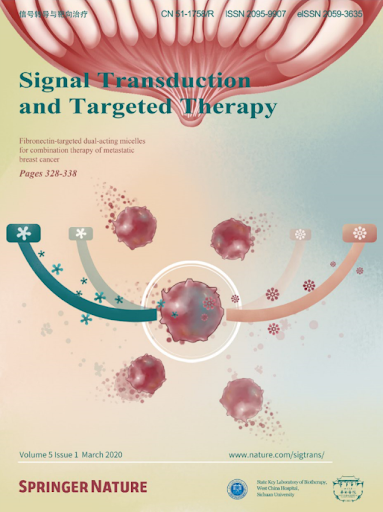Viral oncogenesis in cancer: from mechanisms to therapeutics.
IF 40.8
1区 医学
Q1 BIOCHEMISTRY & MOLECULAR BIOLOGY
引用次数: 0
Abstract
The year 2024 marks the 60th anniversary of the discovery of the Epstein-Barr virus (EBV), the first virus confirmed to cause human cancer. Viral infections significantly contribute to the global cancer burden, with seven known Group 1 oncogenic viruses, including hepatitis B virus (HBV), human papillomavirus (HPV), EBV, Kaposi sarcoma-associated herpesvirus (KSHV), hepatitis C virus (HCV), human T-cell leukemia virus type 1 (HTLV-1), and human immunodeficiency virus (HIV). These oncogenic viruses induce cellular transformation and cancer development by altering various biological processes within host cells, particularly under immunosuppression or co-carcinogenic exposures. These viruses are primarily associated with hepatocellular carcinoma, gastric cancer, cervical cancer, nasopharyngeal carcinoma, Kaposi sarcoma, lymphoma, and adult T-cell leukemia/lymphoma. Understanding the mechanisms of viral oncogenesis is crucial for identifying and characterizing the early biological processes of virus-related cancers, providing new targets and strategies for treatment or prevention. This review first outlines the global epidemiology of virus-related tumors, milestone events in research, and the process by which oncogenic viruses infect target cells. It then focuses on the molecular mechanisms by which these viruses induce tumors directly or indirectly, including the regulation of oncogenes or tumor suppressor genes, induction of genomic instability, disruption of regular life cycle of cells, immune suppression, chronic inflammation, and inducing angiogenesis. Finally, current therapeutic strategies for virus-related tumors and recent advances in preclinical and clinical research are discussed.癌症中的病毒致癌:从机制到治疗。
2024年是爱泼斯坦-巴尔病毒(EBV)被发现60周年,这是第一种被证实会导致人类癌症的病毒。病毒感染显著增加了全球癌症负担,已知有7种1族致癌病毒,包括乙型肝炎病毒(HBV)、人乳头瘤病毒(HPV)、EBV、卡波西肉瘤相关疱疹病毒(KSHV)、丙型肝炎病毒(HCV)、人t细胞白血病病毒1型(HTLV-1)和人类免疫缺陷病毒(HIV)。这些致癌病毒通过改变宿主细胞内的各种生物过程,特别是在免疫抑制或共同致癌暴露的情况下,诱导细胞转化和癌症发展。这些病毒主要与肝细胞癌、胃癌、宫颈癌、鼻咽癌、卡波西肉瘤、淋巴瘤和成人t细胞白血病/淋巴瘤有关。了解病毒致癌机制对于识别和描述病毒相关癌症的早期生物学过程,为治疗或预防提供新的靶点和策略至关重要。本文首先概述了病毒相关肿瘤的全球流行病学、研究中的里程碑事件以及致瘤病毒感染靶细胞的过程。然后重点介绍了这些病毒直接或间接诱导肿瘤的分子机制,包括致癌基因或肿瘤抑制基因的调控、诱导基因组不稳定、破坏细胞的正常生命周期、免疫抑制、慢性炎症和诱导血管生成。最后,讨论了目前病毒相关肿瘤的治疗策略以及临床前和临床研究的最新进展。
本文章由计算机程序翻译,如有差异,请以英文原文为准。
求助全文
约1分钟内获得全文
求助全文
来源期刊

Signal Transduction and Targeted Therapy
Biochemistry, Genetics and Molecular Biology-Genetics
CiteScore
44.50
自引率
1.50%
发文量
384
审稿时长
5 weeks
期刊介绍:
Signal Transduction and Targeted Therapy is an open access journal that focuses on timely publication of cutting-edge discoveries and advancements in basic science and clinical research related to signal transduction and targeted therapy.
Scope: The journal covers research on major human diseases, including, but not limited to:
Cancer,Cardiovascular diseases,Autoimmune diseases,Nervous system diseases.
 求助内容:
求助内容: 应助结果提醒方式:
应助结果提醒方式:


